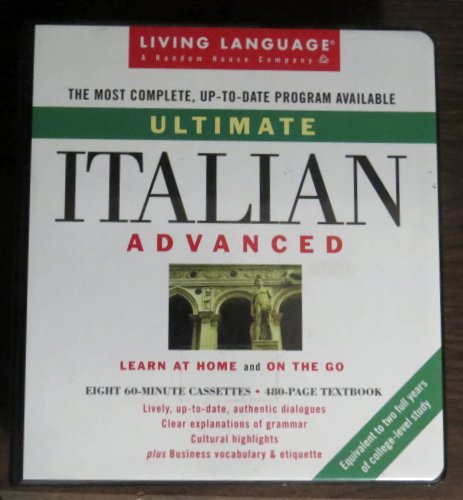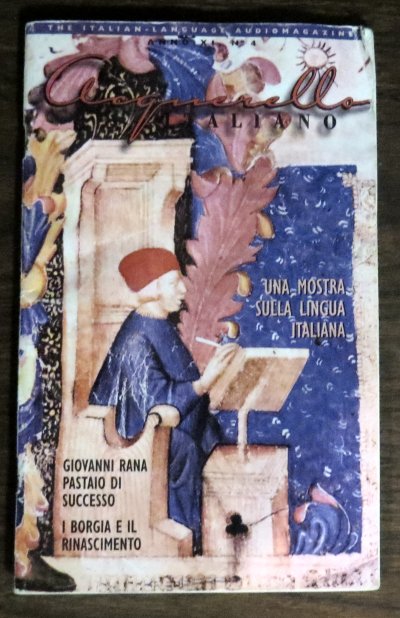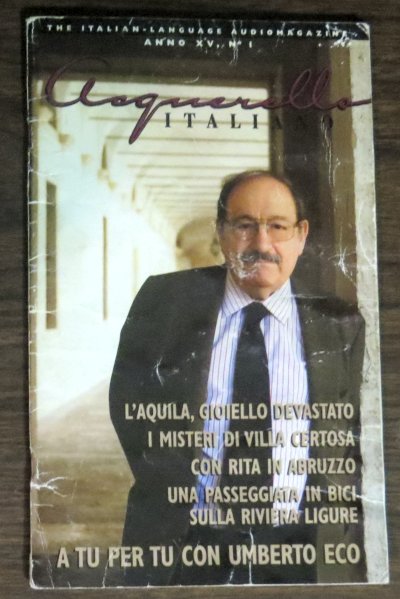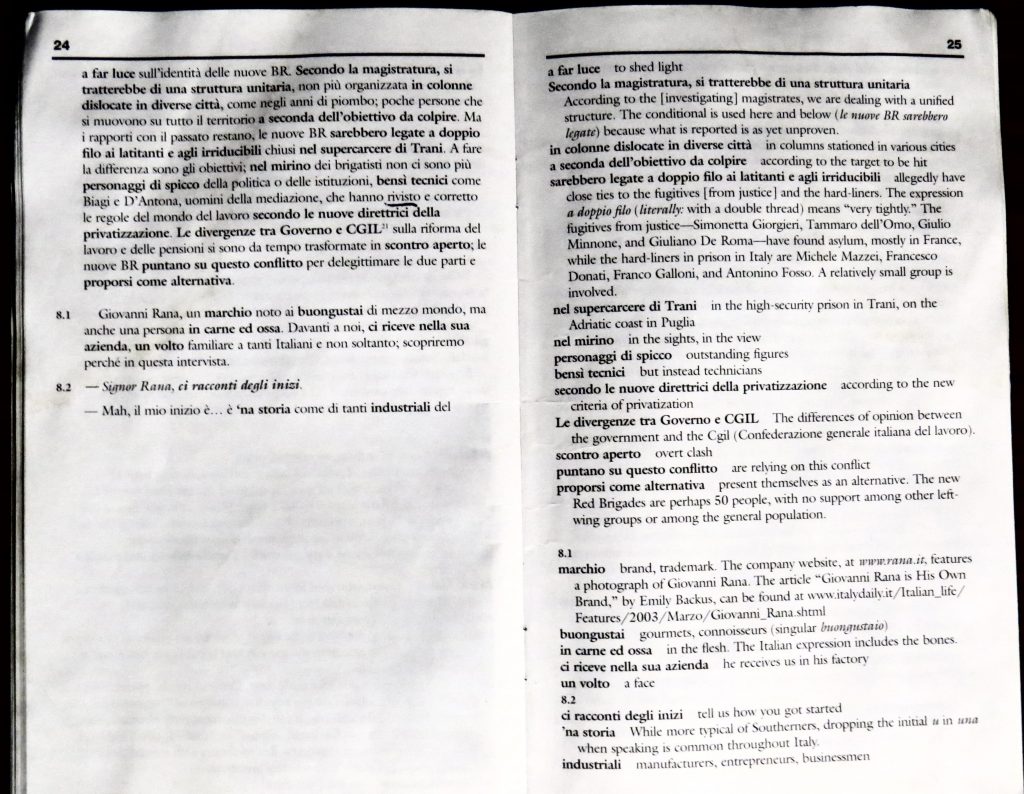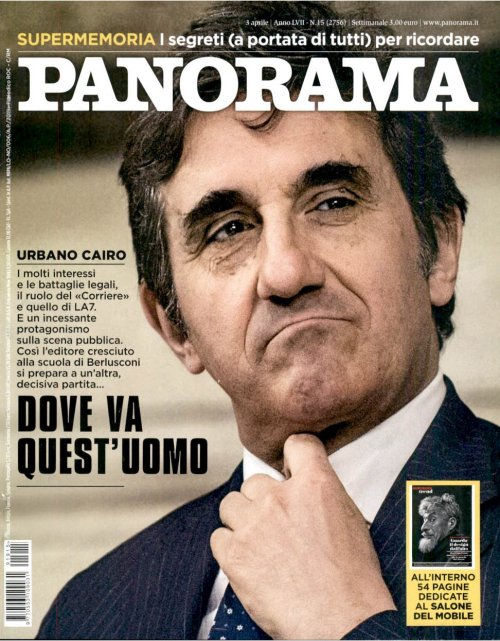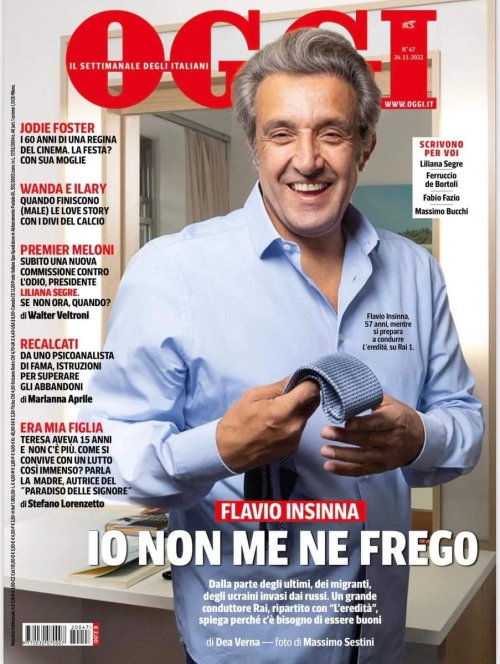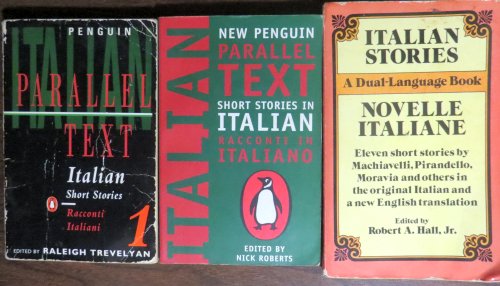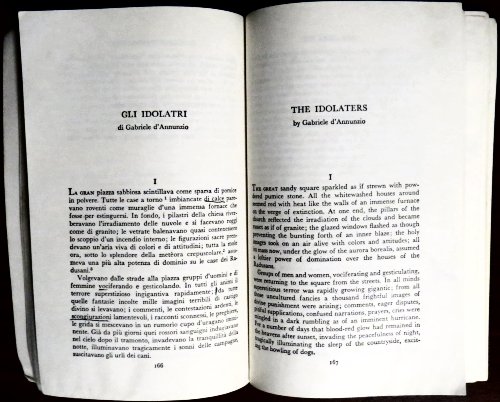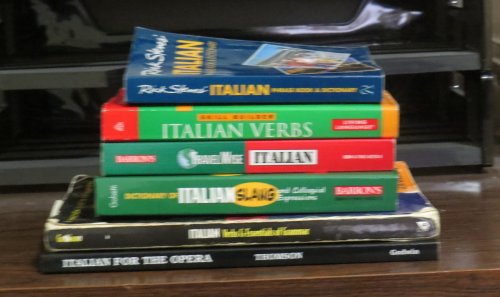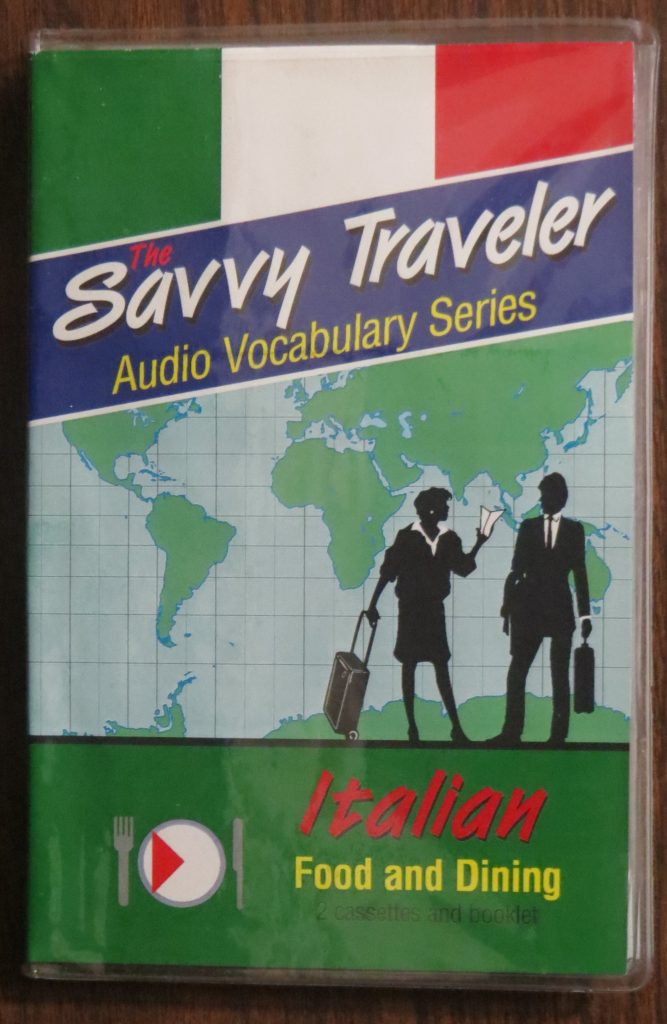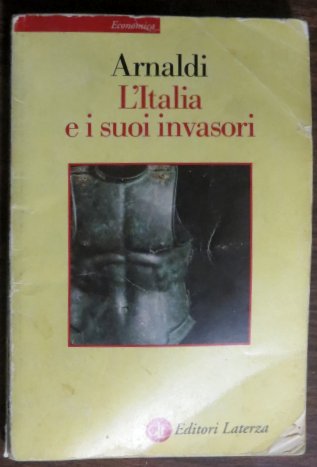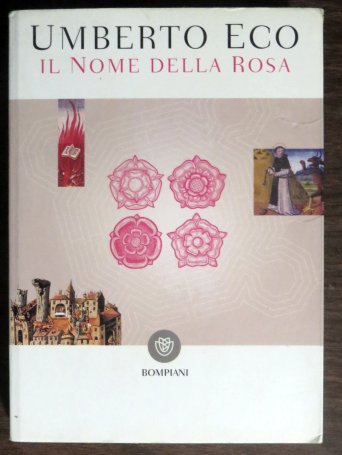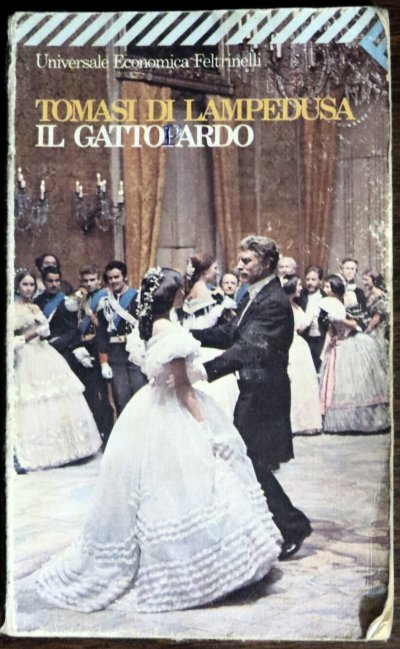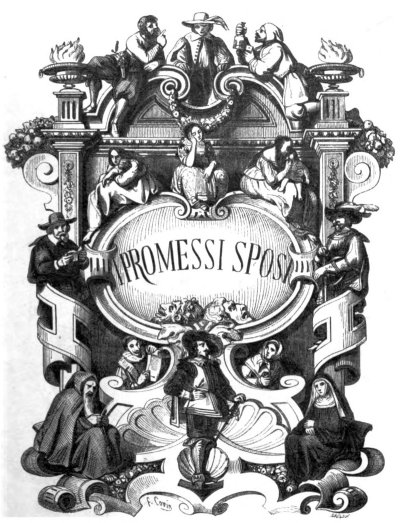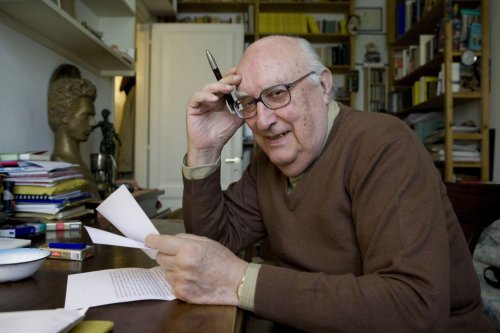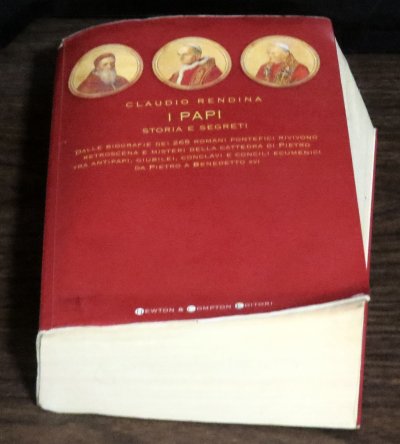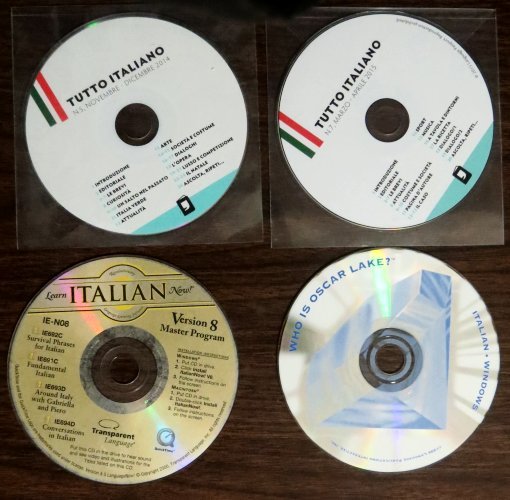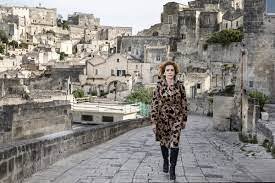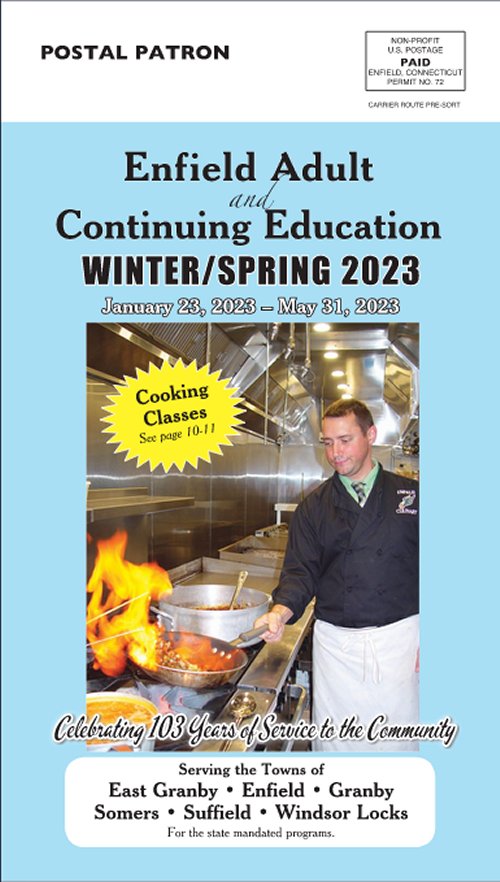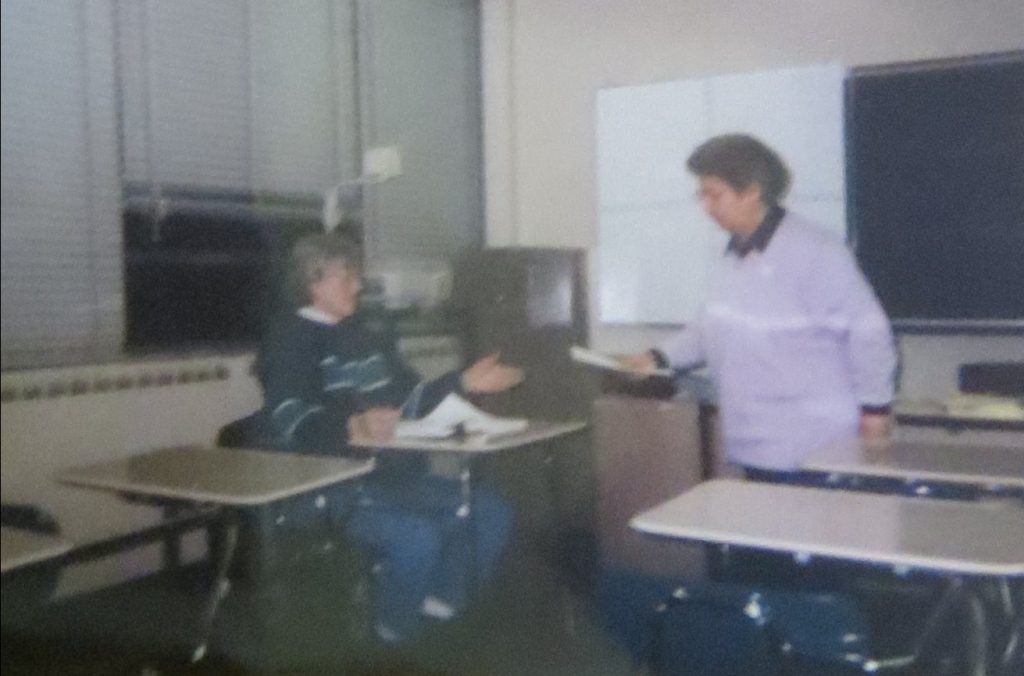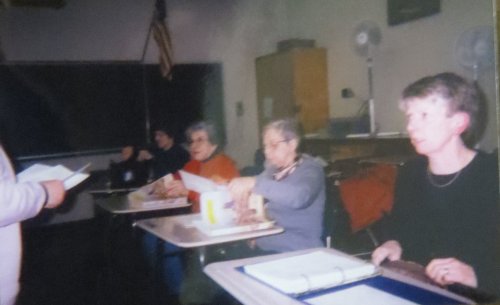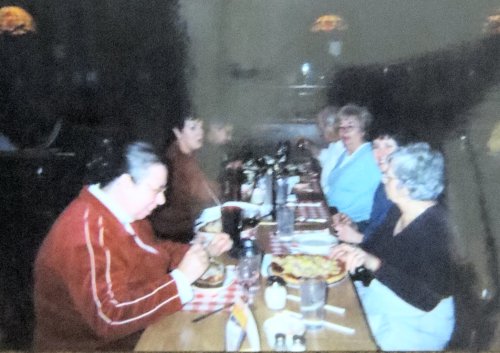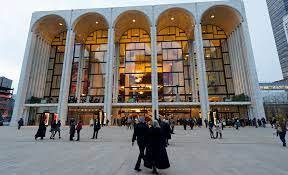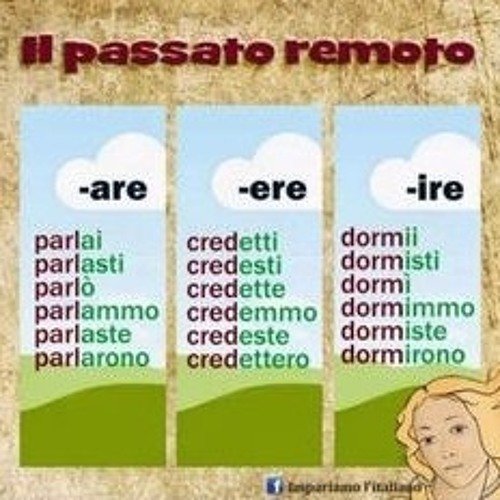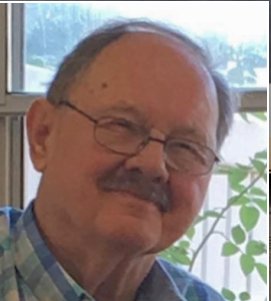Books and tapes. Continue reading
Some of the events and activities described in this entry began before I stopped taking classes in 2006 (described here). Some of them continued after I resumed taking the advanced Italian classes in 2014. Also, I might be wrong about either or both of those dates. I can’t think of any good way to check either one. Nevertheless, it seemed appropriate to group all of the extracurricular efforts that I have undertaken to increase my mastery of Italian in one place regardless of whether I was also attending one of the classes when I performed them.
Boxed lessons: I had purchased the introductory Ultimate Italian set after the last session of the beginning Italian class in May of 2002. Almost as soon as I finished its last lesson I returned to Barnes & Noble and purchased the advanced set of Ultimate Italian. I was not under severe time pressure this time, but I used the same strategy as I had before. I read through the textbook in the order presented, and I did all of the exercises. I had a better attitude than I had when I was doing just enough in school to get by. I studied each lesson thoroughly. I planned to go to Italy more than once, and I did not want to sound foolish when I tried to converse with the locals.
Both Ultimate Italian packages contained eight one-hour tapes and a book of grammar lessons and dialogues. The tapes mostly consisted of Italian speakers reading the dialogues in the book. They left time for the listener to repeat the sentence out loud.
I listened to these tapes every time that I was in my car. My trusty Saturn came with a cassette player, and, when I bought my blue Honda in 2007, I insisted—to the amusement of the sales rep—that it too should have one. Cassettes were superior to CDs (or anything else) for this purpose because rewinding the tape back a sentence or two was very easy. I did this often, and I am happy to report that I never had an accident or even a close call while doing so.
Acquerello Italiano: I don’t remember how or when I heard of Acquerello Italiano, a subscription that released—originally every two months but near the end only occasionally—a small magazine accompanied by a cassette tape or CD. The left side of each pair of facing pages in the magazine contained Italian text with numbered endnotes and, in bold typeface, difficult phrases. On the right side were detailed explanations in English of the difficult or idiomatic phrases. At the end were the notes explaining—in English—historical or sociological background for the text. Each issue contained a pleasant diversity of materials. Since the subject of every article was Italy and/or Italians, almost every issue featured some music samples and something about food, often including recipes.
The tapes contained everything on the left-side pages as well as the music. The articles were read by actors, but there were also some real interviews.
I really enjoyed Acquerello Italiano, and I was very disappointed when the company went out of business. I could find almost nothing about the magazines on the Internet. The only thing that I know is that the name of the publisher was Champs Elyssées, Inc., which was a small business that also published similar educational material in German, French, and Spanish. The company’s home base was Nashville, TN. Someone in Italy must have provided them with the material, but I never determined who was responsible on the Italian side.
I saved nineteen issues of those magazines. The oldest one had a copyright of 2004. The last date is 2009. I did not save any of the tapes. I had played each one countless times by the time that I bought a new Honda in 2018. Most of the tapes had eventually been damaged beyond repair because of the playing and rewinding. At any rate Honda no longer offered the option of a cassette player in their new vehicles.
Magazines: I was still doing quite a bit of travel for business in the early part of the “on my own” period of my Italian education. I discovered that one of the bookstores in Penn Station sold a few magazines in foreign languages. My favorites were Panorama and Oggi (which means “today”). Whenever I found one I purchased it and read it from cover to cover. Whenever I found new words I marked them in my Italian dictionary2. I also added them to my flash cards3.
I also found at least one bookstore in a strip mall that sold a few such magazines as well. I have a vague memory that it was in Pittsburgh. I went there to install and train the people in the advertising department at Dick’s Sporting Goods. Those adventures are described here.
Books of short stories: For quite some time Barnes and Noble stocked books of short stories that were written in Italian. I bought three of these books and read all of the stories. They all had similar formats: Italian on even-numbered pages (left) and English translation on odd-numbered pages (right).
Whenever I encountered new words, I added them to my flash cards and marked them in the dictionary.
I read every story and have even returned to ones that were written by people whom I had seen mentioned in other books or magazines.
Miscellaneous learning aids:I purchased quite a few books that addressed things that were not covered thoroughly by the books and magazines that I had read. For the most part these contained lists of words that were important for tourists. Since the need for food necessitated communication with someone more than once per day, many contained items one might find on menus.
The item displayed on the right only looks like a book. It is actually a set of two tapes designed strictly to help the listener converse with Italians about food and to order from an Italian menu. I am sure that there are many restaurants in Italy that have menus that do not also contain English descriptions and hire only waiters that do not understand a word of English. However, in the sixty or seventy days that I have spent in Italy I do not think that I ever encountered one.
I think that someone bought the tapes for me. I thought that The Savvy Traveler was the name of Rudy Maxa’s series on PBS, but apparently it was actually the name of his radio show for Minnesota Public Radio. I used to watch his television programs, but I don’t think that I ever heard him and Diana Nyad on National Public Radio.
Books: The first book that I read that was completely in Italian was L’Italia e i suoi invasori by Girolamo Arnaldi, a medieval scholar who studied at both the University of Bologna and La Sapienza in Rome. I found the book in a bookstore in Assisi on our second visit there in 2005. I was determined to find something that I could take home with me, and this volume was perfect. Parts of it were difficult for me, but I managed to get through the entire book. It broadened my understanding of how the fact that the Italian peninsula had been repeatedly invaded changed everything. Subsequently that has colored my understanding of every aspect of Italian history.
I read three other outstanding books. The first was Il Nome della Rosa by Umberto Eco. I had read the English version back in the eighties, and I had read quite a few of Eco’s other works. I had a good time becoming reacquainted with the plot, which was more meaningful since this time I was familiar with Pope John XXII and the two competing branches of Franciscans. I also was well aware of the power that the monasteries in the fourteenth centuries wielded. However, I was a little disappointed that very little was lost in translation.
That definitely could not be said for Il Gattopardo, the wonderful story of the Risorgimento in Sicily and southern Italy written by Giuseppe Tomasi di Lampedusa. The story itself is extremely compelling. The birth of the Italian Republic is very difficult to comprehend, and this insider view was very useful in helping me get a grasp on it.
It was made into a movie called The Leopard that starred Burt Lancaster TCM allegedly owns this movie. However, my wife Sue watches TCM almost every day, and she has told me that they never show it, not even when Burt Lancaster is the star of the month.
I slightly cheated on both of these books. I owned English translations of both of them—what we called in college “ponies”. Only occasionally did I need to consult the English translation to decipher the original text
I had heard about I promessi sposi, the classic novel of the Church, the nobility, the Italian side of the Thirty Years War, starvation, and the plague, from an article in Acquerello Italiano. Apparently all Italian children were required to read it, and almost all of them hated it. I decided that I had to try it. I don’t remember every having a printed copy, and so I must have purchased it on Kindle or downloaded it from somewhere. I am pretty sure that it was in the public domain.
The book was written by Alessandro Manzoni in the 1840’s. Reading it was a powerful experience for me! I would recommend it to anyone who wants to gain an understanding of the evolution of Italy. If it is not the greatest Italian work since Dante, all discussions of that designation must begin with it.
I also read a handful of recent popular novels. One was an Italian translation of a historical novel written originally in English. I no longer have a copy, and I remember little about it. I also read a couple of the Commisario Montalbano novels by Andrea Camilleri on Kindle. They were highly recommended by Susanna Perrucchini, the guide on our tour of Sicily in 2016.4 I have seen all thirty-seven of the made-for-television Montalbano movies on the streaming service MHz Choice. I liked the first thirty-six a lot. The last one was very disappointing.
Camilleri’s novels are written half in Italian and half in Sicilian dialect. This frustrated me because most of the dialogue is in dialect. I often could not understand it, and I did not know where to find out what was going on. I guess that I could have also purchased an English version.
I bought one other massive tome, I papi; storia e segreti by Claudio Rendina. I cannot claim that I read all 864 pages, but I did consult his treatment—which was pretty thorough—of several popes in different eras of papal history. Knowing that the papacy was held in very low esteem in Italy in the nineteenth century, I suspected that Rendina might have access to some sources outside of the Church’s official party line. In the entries that I read, however, I did not find that to be the case.
CDs and DVDs: Over the year I collected a few CDs and DVDs that were supposed to help with conversational Italian. I found them lying around in my bookcase. I have only a vague recollection of most of them.
The “Who is Oscar Lake?” DVD in the lower right was an interactive story. It was a mystery about the a mysterious person named Oscar Lake. It was my introduction to the word “commisario”. I don’t remember much else. Maybe I should try it again when I get done with The 1948 Project.
Videos: For a year or two we were able to receive transmissions from RAI Uno, the primary Italian station owned and operated by the government, with our Cox subscription. After a year or two we abandon it in order to save $10 per month. Up until then I watched some news shows and a few other programs on RAI, but I did not get a lot out of it.
Shortly thereafter I discovered that some of the same shows were available for free on the Internet. This was far superior. If you missed something, you could back up the video and repeat a section.
Much later I began watching European television shows on MHz Choice. Thecaptions in English that they provided were ordinarily quite good. In addition to the Commissario Montalbano movies I have watched the prequel series Giovane Montalbano, I bastardi di Pizzofalcone, Nebbie e delitti, Barlume, Commissario Vivaldi, Commissario De Luca, and Imma Tataranni. I liked all of these except Vivaldi. In my opinion Imma was the best, and it is still in production. The action is set in, of all places, Matera. I only pay $8 per month for MHz Choice, and I have literally watched hundreds of good shows.
For me one of the most enjoyable activities when I heard what the character said, and the person who created the captions made a mistake. It did not happen often with MHz Choice.
Drills while exercising: When I was jogging in the evenings or on weekends I would sometimes spend the time counting (often out loud) in Italian from one to one hundred, first with the cardinal numbers: uno, due, tre, ecc. Then I would do the ordinal numbers: primo, secondo, terzo.
When TSI began to close down in 2014 I had time to rejoin the adult ed Italian classes. The semi-annual booklet listed the teacher at all three levels as Mrs. Trichilo. That period is described here.
1. Acquerello is the Italian word for watercolor. It always struck me as a strange choice for the title of a magazine.
2. In 2022 I am on my third Italian dictionary, Webster’s New World Italian Dictionary Concise Edition. The first one that I bought was from a different publisher. The second one was the same Webster’s edition as the third. I needed to buy new dictionaries because the previous ones were so worn out that they were unusable—covers missing, spines broken, pages falling out. I brought them with me on both vacations and business trips.
3. The flash cards were home-made. One side contained a single English word or phrase. The other side listed Italian words or phrases. The cards were sorted alphabetically by the English word or phrase. I created over ten thousand of these cards, which were split into dozens of decks, and I drilled myself on them at every opportunity—at home, on the road, and at lunch when at the office. When I stopped this process I threw away the cards.
4. You can read my journal of that entire memorable trip here.


